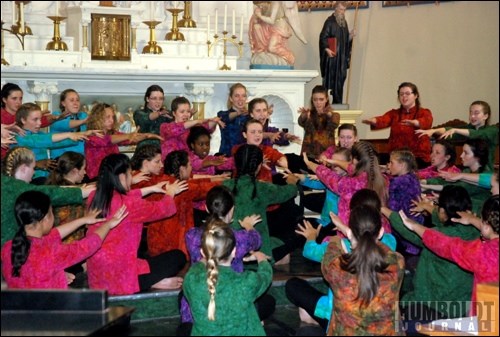The day was stormy, the crowd was large, and the performance was memorable.
About 200 people came out to Assumption Church in Marysburg on a stormy evening to take in a performance of the Saskatoon Children's Choir.
The 42-member choir was featured in the third concert of the Marysburg Summer Festival of the Arts on June 25, drawing the biggest crowd so far this season.
The concert was called "Songs for Africa," and it was announced during the course of the evening that the choir will be going to Â鶹ÊÓƵ Africa in July to perform a series of benefit concerts for schools there.
This was the third visit the world-renowned choir had paid to Assumption Church.
"We absolutely love performing in this beautiful, beautiful church," said Phoebe Voigts, the choir's artistic director during a break between two songs.
The choir began the concert with the light acapella piece "Festive Alleluia" by Lyn Williams, then filled the rafters of the church with their very mature rendition of "Dies Irae" by Z. Randall Stroope.
For their third piece, a very soft, sad, acapella account of being frozen in "Frobisher Bay," by James Gordon, the choir moved closer to the audience and sat down.
It was at this point, for many in the audience, that it started to sink in that this was not your typical children's choir. The maturity and control these girls showed in their voices is proof of the years of work and effort they have already put into perfecting their individual voices and their sound as a group.
Their fourth piece of the night, a quick rollicking French song "Noel des enfants" had the choir back on their feet, and their fifth piece, another in French, "J'entends le moulin," had some members playing small instruments, including the cowbell, and the entire choir stomping and clapping at points.
The choir left the church before performing their sixth piece of the night.
Marysburg actually hosted the world premiere of the piece, called "Quodlibet super Lorem ipsum" by Peter Tiefenbach, a Canadian composer.
Voigts called this selection "a very special piece that tonight will be heard for the first time."
The choir, she explained, has enjoyed working with some of Canada's finest composers, as it offers the singers an artistic experience.
"The process is creative, exciting and very intimate," she said.
This piece in particular was written for the Saskatoon Children's Choir, and it reflects how Canada is seen around the world - as a mosaic of cultures.
The song was definitely what Voigts called "a Canadian potluck."
It featured little bits of all sorts of music from around the world, from African drums to German and French folk songs, to operatic sections.
For this song, the singers were dressed in colourful outfits and danced along with the music. Some played the violin, others conquered the drums, and the rest of the group performed everything from square dances to African tribal dances.
A light, funny song called "Alice" by Sarah Quartel followed the dramatic Tiefenbach piece, then the choir took a different formation for "Tjak!" by Stephen Hatfield, another Canadian composer.
This piece, it was explained, as the choir sat on the floor, was inspired by a Balinese ceremony, and it imitates monkeys chattering, and features a round which gives it a soothing effect.
The choir, sitting in a cluster on the floor, used hand motions and sounds to indeed evoke the sound of monkeys. The piece was definitely wild, and very different, while at the same time, completely entertaining.
It was back to French for the next song, called "Ah! Si mon moine voulait danser." A very familiar and upbeat song, it featured members of the choir on violins, and playing the washboard and the spoons. To finish, some members even performed clog dances in bare feet.
After a quick intermission, the choir was back to teach the audience the tune to "Hymn to Freedom" by Oscar Peterson, which they would perform with the choir later in the evening.
Then it was back to the performance, as they lifted their voices in a very happy Â鶹ÊÓƵ African praise song called "Gabi Gabi."
Another soft, sad and slow song, this time "Where have all the flowers gone?" by Pete Sieger, came next, which hypnotized the audience.
"Yo Te Nombro Libertad" followed. The mourning song which had the girls in the choir crying out for liberty, was performed using candles which were gradually lit and gradually extinguished.
Next came "Freedom Trilogy" by Canadian composer Paul Halley, which began with a solo by one of the first sopranos in the choir, but quickly involved the entire choir. Included in the trilogy was "Siyahumba," an African hymn.
Finally, it was time for the audience participation portion of the concert, and together, the 200-plus people in the building sang Peterson's "Hymn to Freedom."
Finally, to close out the concert, the choir performed "Blessing," an Irish poem.
For that, the audience rewarded them with a standing ovation.




